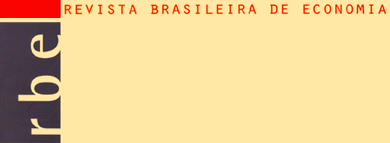Abstract
This paper investigates the effect of real-estate prices on non-durable consumption in Brazil. For that, we build a state-level panel of the determinants of non-durable consumption growth during the period 2008-2017. This period covers both a “boom” in real-estate prices and consumption (2008-2014) as well as a “bust” in them (2014-2017).
We estimate the effect of house prices on consumption combining the techniques and ideas from Campbell e Cocco (2007)Campbell, J.Y., & Cocco, J.F. (2007). How do house prices affect consumption? Evidence from micro data. Journal of Monetary Economics, 54(3), 591-621. http://dx.doi.org/10.1016/j.jmoneco.2005.10.016
http://dx.doi.org/10.1016/j.jmoneco.2005...
and Case et al. (2005)Case, K.E., Quigley, J.M., & Shiller, R.J. (2005). Comparing wealth effects: The stock market versus the housing market. Advances in Macroeconomics, 5(1). http://dx.doi.org/10.2202/1534-6013.1235
http://dx.doi.org/10.2202/1534-6013.1235...
. In particular, we estimated the same reduced-form equation proposed by Campbell e Cocco (2007)Campbell, J.Y., & Cocco, J.F. (2007). How do house prices affect consumption? Evidence from micro data. Journal of Monetary Economics, 54(3), 591-621. http://dx.doi.org/10.1016/j.jmoneco.2005.10.016
http://dx.doi.org/10.1016/j.jmoneco.2005...
, which is derived from simulating a theoretical model of housing and consumption choice under debt constraints. Due to Brazilian-data limitations, we were unable to run panel-data regressions at the cohort level (aggregation across households on different surveys) as in Campbell e Cocco (2007)Campbell, J.Y., & Cocco, J.F. (2007). How do house prices affect consumption? Evidence from micro data. Journal of Monetary Economics, 54(3), 591-621. http://dx.doi.org/10.1016/j.jmoneco.2005.10.016
http://dx.doi.org/10.1016/j.jmoneco.2005...
. Indeed, we had to resort to data aggregated at the state level to estimate our panel-data regressions as did Case et al. (2005)Case, K.E., Quigley, J.M., & Shiller, R.J. (2005). Comparing wealth effects: The stock market versus the housing market. Advances in Macroeconomics, 5(1). http://dx.doi.org/10.2202/1534-6013.1235
http://dx.doi.org/10.2202/1534-6013.1235...
.
Our results suggest that changes in house prices significantly affect non-durable consumption in Brazil. The magnitudes are quantitatively close to the effects found for the U.K. by Campbell e Cocco (2007)Campbell, J.Y., & Cocco, J.F. (2007). How do house prices affect consumption? Evidence from micro data. Journal of Monetary Economics, 54(3), 591-621. http://dx.doi.org/10.1016/j.jmoneco.2005.10.016
http://dx.doi.org/10.1016/j.jmoneco.2005...
. Furthermore, we document that the effect of house prices on non-durable consumption is asymmetric, stronger in the “bust” than in the “boom” phase of the business cycle. This difference in the effects during different phases of the business cycle suggests that borrowing constraints might explain the effects of house prices on nondurable consumption.
Keywords:
Real estate; non-durable consumption; wealth; panel data

 Note: The figure reports monthly real growth rates of house prices from February 2008 to December 2017.
Note: The figure reports monthly real growth rates of house prices from February 2008 to December 2017.
 Note: The figure reports monthly real growth rates of house prices in São Paulo and Rio de Janeiro from February 2008 to December 2017.
Note: The figure reports monthly real growth rates of house prices in São Paulo and Rio de Janeiro from February 2008 to December 2017.
 Note: The figure reports monthly real growth rates in house prices from February 2008 to January 2018.
Note: The figure reports monthly real growth rates in house prices from February 2008 to January 2018.
 Note: The figure reports monthly real growth rates in house prices from February 2008 to January 2018.
Note: The figure reports monthly real growth rates in house prices from February 2008 to January 2018.
 Note: The figure reports monthly real growth rates in house prices from February 2008 to January 2018.
Note: The figure reports monthly real growth rates in house prices from February 2008 to January 2018.
 Note: The figure reports monthly real growth rates in house prices from February 2008 to January 2018.
Note: The figure reports monthly real growth rates in house prices from February 2008 to January 2018.
 Note: The figure reports monthly real growth rates in house prices from February 2008 to January 2018.
Note: The figure reports monthly real growth rates in house prices from February 2008 to January 2018.
 Note: The figure reports monthly real growth rates in house prices from February 2008 to January 2018.
Note: The figure reports monthly real growth rates in house prices from February 2008 to January 2018.
 Note: The figure reports monthly real growth rates in house prices from February 2008 to January 2018.
Note: The figure reports monthly real growth rates in house prices from February 2008 to January 2018.
 Note: The figure reports monthly real growth rates in house prices from February 2008 to January 2018.
Note: The figure reports monthly real growth rates in house prices from February 2008 to January 2018.
 Note: The figure reports monthly real growth rates in house prices from February 2008 to January 2018.
Note: The figure reports monthly real growth rates in house prices from February 2008 to January 2018.
 Note: The figure reports monthly real growth rates in house prices from February 2008 to January 2018.
Note: The figure reports monthly real growth rates in house prices from February 2008 to January 2018.